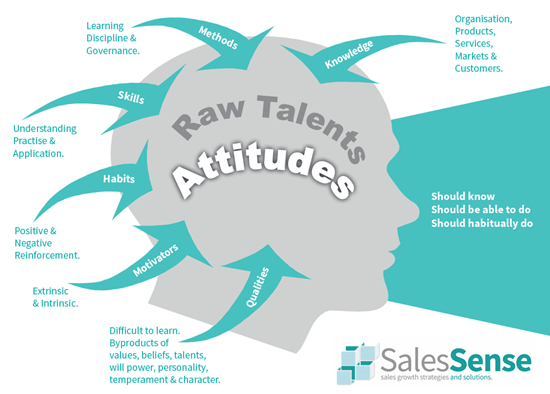If you want to sell more, earn more, or be more successful, learn more. Invest in sales training.

Regular salestraining is more than a 'nice to have', it's essential for businesses and sales professionals aiming to stay ahead. Over time, reliable and effective habits fall into disuse. On the sports field, teams rise and fall. When things go awry, the coach takes training back to basics.
Sales training should be just what you need, when you need it. Take a shortcut. Schedule a call and tell me what you are looking for. I'll share what I know. Reach out today for a salestraining special offer.
Is sales training worth the money?
In today's evolving market landscape, sales ability is more important than ever. Achieving exceptional sales performance demands more than inherent talent or a persuasive pitch. Top performance depends on continuous learning and adaptation.
This article explores the empirical evidence supporting the principle that a regular focus on improving sales techniques leads to superior sales outcomes.
Here is a tech sector case study:
Elevating Sales Performance in an Enterprise Software Vendor
The sales team consisted of technically skilled account executives, but many struggled to translate product knowledge into persuasive sales conversations. Managers lacked a coaching framework and spent most of their time on operational issues and forecasting rather than team development. Deal velocity was slowing and conversion rates were falling, especially in enterprise-level deals. After some investigation, senior management decided on a 12-week sales performance training programme for both sales teams and their managers. The programmes focused on value-based selling in technical sales environments, discovery and objection handling frameworks, sales manager coaching and accountability routines, live role-plays, and real-deal workshops. In the remainder of the year, managers spent more than twice as much time conducting coaching and deal reviews.
Results for the year in which the training took place included a 24% improvement in the lead-to-sale conversion rate, an increase of 19% in enterprise deal size, and a reduction in the average sales cycle of 34 days.
"We were great at talking about our product, but not always about our customers’ outcomes. This training flipped that. Now our team leads with value and it’s made a visible difference." Head of Sales

Why is continuous sales training important?
"The only source of competitive advantage is getting better faster than your competitors," wrote Tom Peters
Regular sales training provides salespeople with knowledge about market changes, changing customer behaviours, and new sales methodologies. Continuous learning ensures that sales teams stay ahead of their competitors.
The only way salespeople can retain an edge is through continuous development. While a few individuals can achieve this on their own through a learning habit, most learning depends on a programme of training and exercises.
Here is a case study:
B2B IT Infrastructure Solutions Provider (EMEA Region)
The company had previously invested in one-off sales training workshops and experienced short-term improvements; however, results returned to pre-training levels. Management lacked a system to reinforce new skills, and performance was inconsistent quarter-to-quarter. Implementing a 12-month sales enablement programme through fractional services changed everything. The programme included monthly virtual salestraining modules (e.g., negotiation, discovery, executive-level selling), quarterly in-person workshops and performance labs, ongoing manager coaching frameworks and peer-to-peer coaching, and embedding of process and learning in the CRM system.
Deal conversion rates rose by 18%, sustained over four consecutive quarters. Manager coaching quality improved by 40%, based on salesperson feedback. Sales staff turnover dropped by 38%, attributed to improved enablement and growth paths, and sales productivity increased by 32% year-over-year.
"We used to see performance spikes after training — now we see sustained growth. Ongoing development has turned our sales team into a learning organisation, and it’s paying off in our numbers." CEO
How does training affect sales performance?
Several studies highlight the direct benefits of regular sales training:
A study by the Sales Management Association found that sales teams that received ongoing training achieved a 17% higher annual revenue growth than teams that didn't. This correlation between regular sales training and increased revenue underscores the tangible benefits of investing in continuous sales education.
The ROI of Sales Training: Research by the American Society for Training and Development (ASTD) showed that companies investing in comprehensive training programs have 218% higher income per employee than those with less comprehensive training. This demonstrates the direct financial benefits of regular sales training initiatives.
Improving Win Rates: CSO Insights' research found that companies with dynamic, adaptable sales training programs had a 32.7% higher win rate on forecasted deals. This suggests that regular training directly contributes to closing more deals.
Enhancing Sales Productivity: A study by the Aberdeen Group revealed that best-in-class companies, defined as the top 20% of performers, were twice as likely to provide ongoing sales training compared to laggard organisations. These companies also saw a 20% increase in the attainment of sales quotas.
The empirical evidence is clear: regular sales training is a critical investment for any organisation aiming to achieve exceptional sales performance. By fostering a culture of continuous learning, businesses can equip their sales teams with the skills, knowledge, and strategies needed to excel.
How do you differentiate yourself as a salesperson?
In a crowded marketplace, all salespeople sound the same. They ask the same questions, make the same assertions, and use the same hyperbole. They have all been on the same training courses and read the same books. Their customer engagement diminishes differentiation.
Salespeople who know more, who pay more attention to customer intent, and who convey a sense of professionalism through their approach and methods, make their organisation stand out from those of competitors. They engender trust, sooner, transfer confidence through their integrity, and create belief by communicating verifiable facts.
When salespeople demonstrate deep knowledge of the customer, their challenges, and their customers, people feel their interests are protected and they can rely on the advice and guidance given.

How does training improve morale?
Continuous effective sales training contributes to a culture of learning and development within organisations. The sense of progress that learning creates boosts morale and helps retain top sales talent. Sales professionals who feel valued are more likely to stay with an organisation, reducing turnover costs and preserving valuable industry knowledge within the team.
For example:
B2B Professional Services Firm (Marketing & Analytics Consultancy)
Following a year of aggressive growth targets, missed quotas, poor internal communication, and a lack of structured support from managers led to low morale, disengagement, and increased sales staff turnover. Managers were focused on numbers, not people, and this led to an unhealthy working environment. The solution involved leadership training, coaching strategies for managers, and mental resilience coaching for the sales team. The improvements were first felt through a reduction of sales staff departures, relieving pressure on hiring replacements. Before and after sales team morale scores increased by 44%, and by the end of the year, sales target achievement had risen from 48% to 72%.
"Before the training, it felt like we were just numbers on a board. Now, I feel like I’m part of a team that’s growing together and that’s changed how I show up every day." Senior Account Executive
What is the best way to increase salestraining?
Little and often is valuable guidance. Have sales staff focus on ways to do what they do, better, at least once a month. Some organisations report exceptional results from weekly interventions.
If someone has the expertise, time to prepare, and the will to organise regular learning events, there is no need to hire an outside agency. The difficulty is usually that everyone already has a full-time job, and no one can make the necessary continuous effort to create sales learning momentum.
If you don't have the resources or expertise in-house, consider hiring fractional sales enablement support. Sales enablement normally includes salestraining and coaching. Try our sales enablement upside quiz.
How can you choose the right sales training partner for an organisation?
In emphasising the importance of regular sales training, this article aims to provide businesses and sales professionals with a compelling case for making continuous learning a cornerstone of their sales plans.
While the benefits of regular sales training are clear, selecting the right training partner can seem bewildering. Look for local providers with experience in your market. Interview them informally through 15 to 30-minute telephone or Zoom calls. Ask about their training methods and how they would address the sort of challenges that you face. Ask hypothetical questions. When you feel confident, you have found the right salestraining partner, take up references.
We differentiate ourselves through transparency. Our methods and examples of our content is published on this website. We specialise in offering personalised, evidence-based sales training programs that are co-created with clients to address their unique challenges and objectives. This approach ensures that training is relevant and directly aligned with the customer objectives. We work with customers to measure the impact of ongoing programmes and continually adjust them to maximise their impact and effectiveness.
Article by Clive Miller
Arrange an informal chat with me.
Sales Training Courses
We draw our material from over twenty training courses created for particular purposes. All our courses are modularised, so we can easily assemble bespoke training course arrangements or deliver individual modules. Occasionally, we are asked to fulfil training needs we haven't previously addressed. To meet such requirements, we create new material as part of our service. This page lists our sales training courses.
If you need a long-term salestraining partner, we are interested in bidding for your business. Telephone +44 (0)1392 851500. We will be pleased to learn about your needs or discuss some options. Alternatively, email custserv@salessense.co.uk or use the contact form here.






















